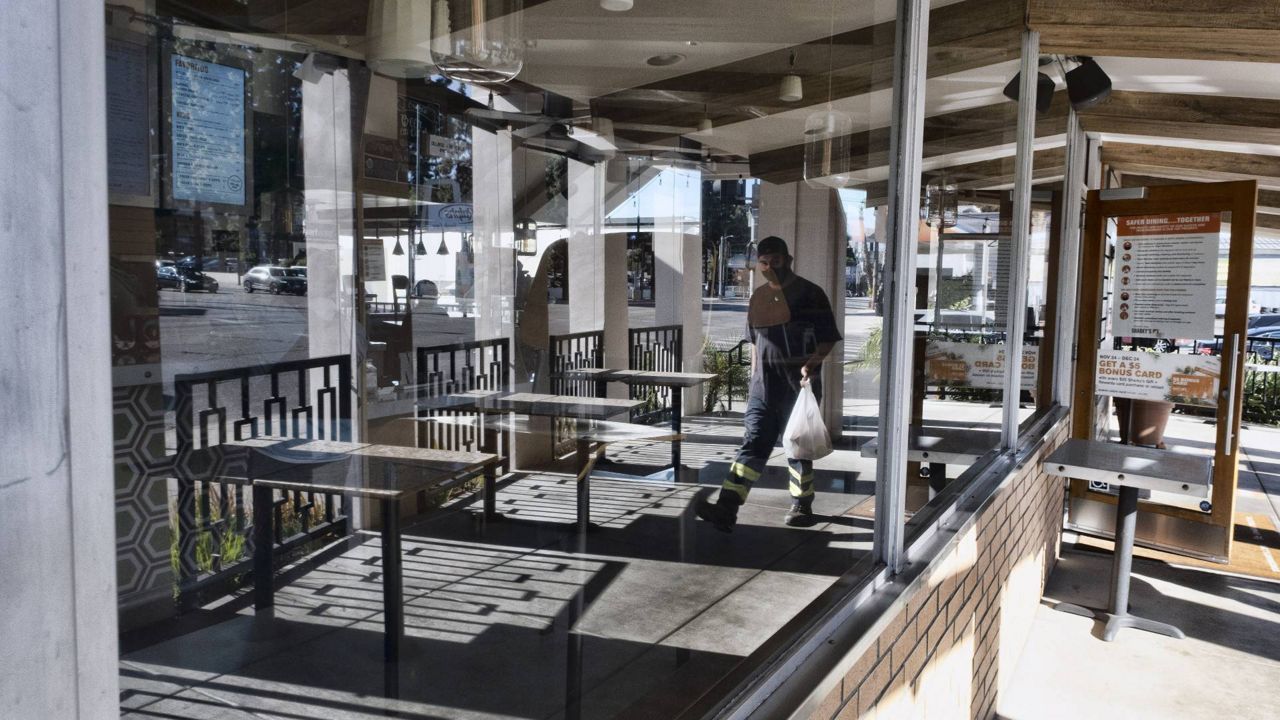LOS ANGELES (CNS) — Los Angeles County health officials acted "arbitrarily" and without a proper "risk-benefit" analysis when they banned outdoor dining as a coronavirus-control measure, a judge tentatively ruled Tuesday, but even if the decision is finalized, it won't immediately restore in-person dining.
In a 53-page tentative ruling, Los Angeles Superior Court Judge James Chalfant said the county "failed to perform the required risk-benefit analysis" before enacting the ban.
What You Need To Know
- A judge ruled Tuesday that L.A. County health officials acted "arbitrarily" when they banned outdoor dining as a coronavirus-control measure
- L.A. Superior Court Judge James Chalfant also noted that the county has shown surging COVID-19 cases are "burdening the health care system and action is necessary"
- Chalfant tentatively suggested an order that would enjoin the county from imposing its dining ban beyond the original three-week time period
- The county Department of Public Health imposed the ban on November 25
"By failing to weigh the benefits of an outdoor dining restriction against its costs, the county acted arbitrarily and its decision lacks a rational relationship to a legitimate end," Chalfant wrote in the tentative ruling, which will be discussed at a 1:30 p.m. hearing stemming from lawsuits filed by the California Restaurant Association and the owner of the downtown Engine Co. No. 28 restaurant, attorney Mark Geragos.
"The balance of harms works in petitioners' favor until such time as the county concludes after proper risk-benefit analysis that restaurants must be closed to protect the healthcare system," Chalfant wrote.
Although Chalfant had already penned the 53-page tentative ruling and upheld it during the hearing, attorneys for the California Restaurant Association are expected to craft a shorter document that Chalfant will sign, making the order official.
The judge noted that the county has shown surging COVID-19 cases are "burdening the health care system and action is necessary." He also said the county has presented "generalized evidence" of transmission risk from outdoor dining.
But he said the county's assertion that the virus can be spread in restaurants by patrons spending extended periods of time without masks "only weakly supports the closure of outdoor restaurant dining, because it ignores the outdoor nature of the activity, which the CDC (U.S. Centers for Disease Control and Prevention) says carries only a moderate risk, and less with mitigations."
While siding with the restaurant industry, Chalfant noted that due to the state's regional stay-at-home order that took effect Sunday night — and which also includes a ban on in-person dining — "outdoor restaurant dining in the county cannot open at this time."
Chalfant instead enjoined the county from imposing its dining ban beyond the original three-week time period, which ends Dec. 16. The state's order at a minimum will be in place until Dec. 27. But Chalfant said the county -- which is obliged to adhere to the state's order -- can only extend the restriction beyond that "after conducting an appropriate risk-benefit analysis."
Chalfant wrote that he can't dictate what that analysis should entail, but suggested that the county "could be expected to consider the economic cost of closing 30,000 restaurants, the impact to restaurant owners and their employees and the psychological and emotional cost to a public tired of the pandemic and seeking some form of employment in their lives."
The county Department of Public Health imposed the ban on November 25, citing surging COVID-19 cases and hospitalizations. The county Board of Supervisors debated the issue on November 24, but voted 3-2 to support the ban, arguing that restaurant patrons spend extended periods of time in close proximity and without wearing masks.
Related Stories
- Bikes Mean Business, Bringing Customers to Struggling Restaurants
- LA City Council Member Says Banning Outdoor Dining Not a Solution to Reducing COVID-19 Cases
- Pasadena Ends Outdoor Dining; Restrictions Follow New Stay-At-Home Order
- Loopholes and Defiance: State Health Order Could Heat Debate Over Patio Dining
The California Restaurant Association and Geragos, however, challenged the ban in court.
"The recent order with no stated scientific basis from L.A. County singles out a specific industry and could jeopardize thousands of jobs," Jot Condie, president/CEO of the California Restaurant Association, said in a statement announcing the lawsuit. "There are thousands of restaurants and many thousands more employees who could be out on the street right before the holiday season."
Prior to the ban on outdoor dining being imposed, the county had already restricted restaurant patios to 50% of capacity.
The ban on in-person dining has been met with an outcry from restaurant owners across the county, with some saying they spent thousands of dollars to establish safe outdoor dining spaces under the previous county guidelines, only to be forced to shut down on November 25 without justification.
Opponents of the ban have said it would cause tens of thousands of restaurant workers to lose their jobs. There are more than 30,000 restaurants in Los Angeles County.



